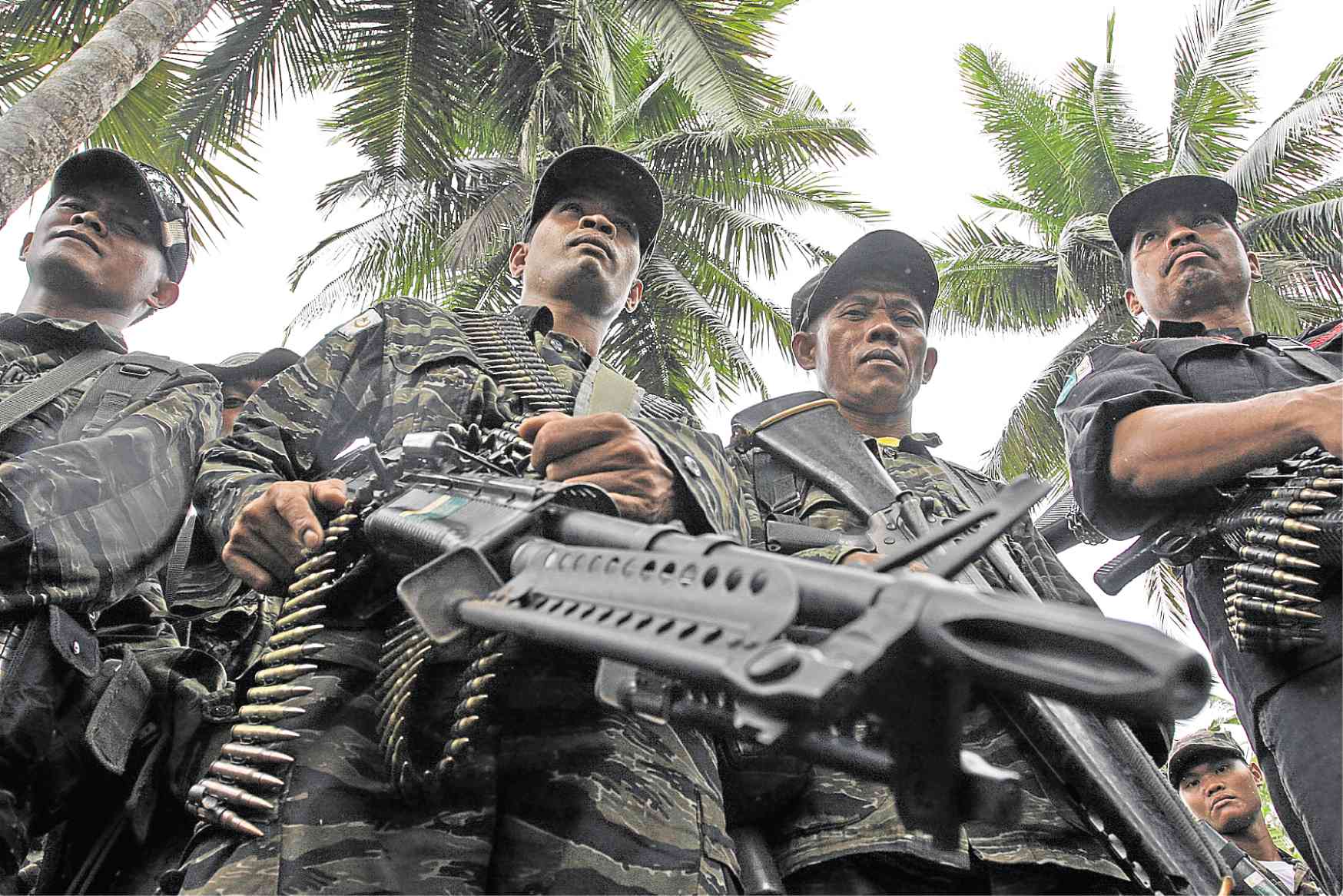50% turnout ideal for BOL poll

STEP TO PEACE Moro rebel guns, like these being carried by Moro Islamic Liberation Front rebels in February 2010 at their camp in Mamasapano, Maguindanao, had been silent for years following peace negotiations with the government. —JEOFFREY MAITEM
ZAMBOANGA CITY—Proponents of the Bangsamoro Organic Law (BOL) were brimming with confidence that the measure would be approved in a plebiscite but an election official said turnout should be high to make the results more convincing.
The plebiscite is barely two weeks away and an election official of the Autonomous Region in Muslim Mindanao (ARMM) called on proponents and officials to exert extra effort and step up the campaign to attain at least 50-percent voter turnout.
Lawyer Rey Sumalipao, regional election director of the ARMM, urged the BOL campaigners to maximize their resources, go down to the grassroots and encourage more people to take part in the Jan. 21 plebiscite.
Sumalipao said based on previous uncontested elections, turnout was usually 50 percent “but a massive campaign will certainly help in increasing it.”
2.16M voters
Article continues after this advertisementExpected to troop to the polling places on Jan. 21 are the 2.16 million registered voters of the ARMM.
Article continues after this advertisementARMM Gov. Mujiv Hataman said he expected more Moro people to vote for BOL ratification.
“I know the ‘yes’ will dominate despite some quarters pushing for ‘no,’” Hataman said.
“Of course, they have their right to say no, but my only appeal to them is to refrain from sowing negative information pertaining to the BOL, just stick to the provisions,” he said.
“Allow our people to make the right decision on Jan. 21,” Hataman said.
Hataman urged his people to help disseminate information as there was barely enough time left before the plebiscite.
Sumalipao, however, warned that only noncivil service employees in the ARMM can participate in the campaign.
Sign of support
While opposition to the BOL surfaced after the forum organized by the BOL proponents in Basilan, Mohaqer Iqbal, peace panel chair of the Moro Islamic Liberation Front (MILF), expressed optimism “that more people in Isabela City as well as Sulu will go for the ratification of the BOL.”
In Isabela City, thousands of residents took part in a BOL forum, which Iqbal said was a good sign because of strong opposition to the BOL shown by residents.
In Sulu, Iqbal said almost 8,000 people, along with local officials, took part in the forum, making it a “grand success,” he said.
When asked to define grand success, Iqbal said it was “because many people attended and politicians’ response was very encouraging, speeches all in support of the BOL.”
MILF launched a series of forums to bring awareness about the BOL to the Moro National Liberation Front (MNLF), the sultan of Sulu and the turf of Sulu politicians.
Not MILF alone
Presidential Peace Adviser Carlito Galvez Jr. said the Jan. 5 forum in Sulu drew “tens of thousands of people to show their support” for the BOL.
Murad Ebrahim, MILF chair, said he was surprised by the turnout of people for the forum at Notre Dame College in Jolo.
“I did not expect this crowd,” he said. “I am very pleased to see everybody here,” Ebrahim added.
He said the BOL was not just the work of the MILF but encompassed all signed peace agreements, including those between the government and the MNLF.
“The BOL is not a victory of the MILF but a victory of the entire Bangsamoro people,” Ebrahim said.
“This is the fruit of our sacrifice, the result of our collective efforts,” he added.
“Inshallah we will win in Sulu,” Ebrahim said.
Galvez said the new law was the only way to stop the so-called “generational chain of violence” by allowing the Moro people to effectively run the future Bangsamoro government.
“The BOL is an antidote against terrorism and violent extremism,” he said.